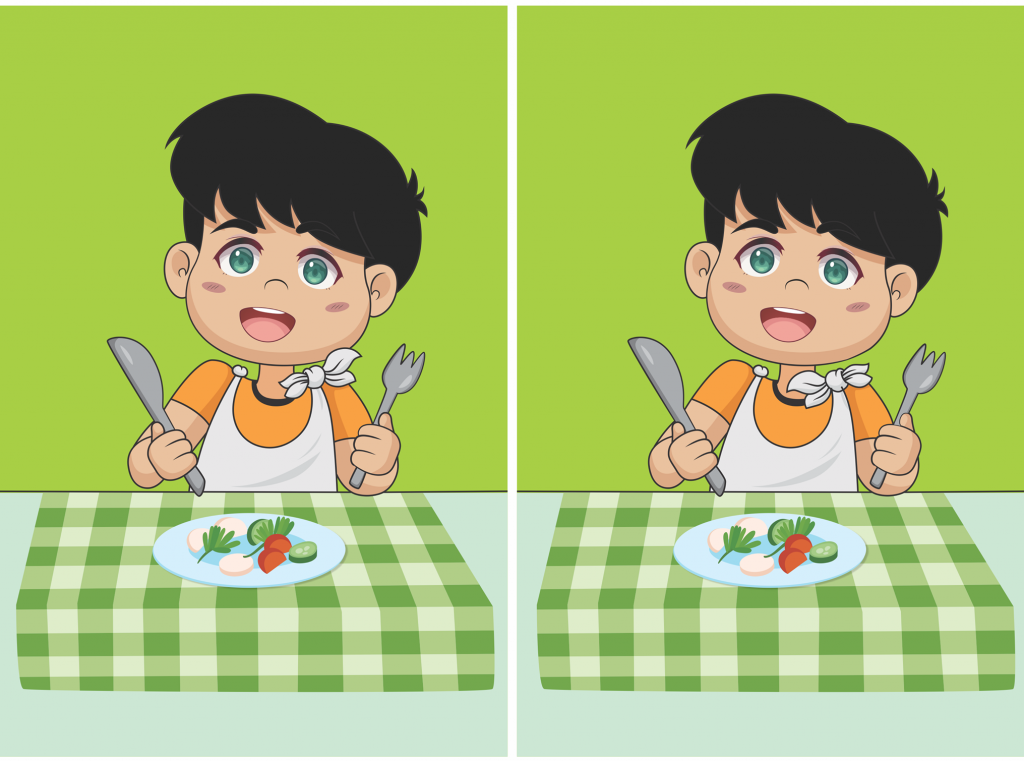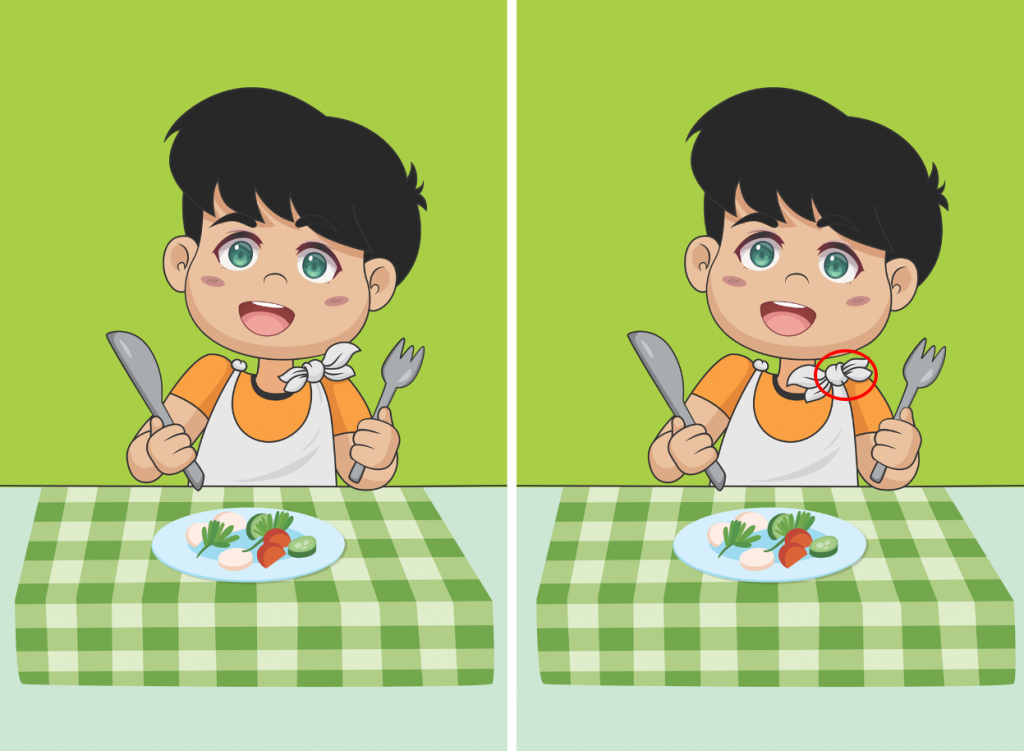The Importance of Healthy Eating for Children: Encouraging Good Habits from an Early Age
Promoting healthy eating habits in children is essential for their overall growth and development. In the image above, we see a young child eagerly preparing to eat a well-balanced meal with vegetables and fruits on the plate. It’s a wonderful example of how food, when chosen wisely, can nourish both the body and the mind.
This article will explore the significance of healthy eating for children, the benefits of balanced nutrition, and how parents can foster positive eating habits in their kids. Through understanding the impact of good nutrition on a child’s development, parents can better equip their children to lead healthy, active lives.

Why Healthy Eating is Crucial for Children’s Development
When children consume a balanced diet, they are setting themselves up for success in various areas of life. Proper nutrition plays a vital role in their cognitive development, physical growth, and emotional well-being. Eating nutrient-rich foods can help children excel in school, build stronger immune systems, and even foster positive emotional health.
Supporting Brain Development
Nutrition is key to brain development during the critical stages of childhood. A diet rich in fruits, vegetables, whole grains, and healthy fats provides essential nutrients like omega-3 fatty acids, iron, and vitamins that help with cognitive function. Foods such as fish, leafy greens, and nuts are particularly beneficial for boosting brainpower, helping kids focus and retain information more effectively.
Promoting Physical Growth
Healthy eating also supports the body’s growth and physical development. Protein-rich foods like chicken, beans, and dairy products aid in muscle and tissue growth. Additionally, vitamins and minerals from fruits and vegetables, such as calcium and vitamin D, are crucial for bone health, while iron ensures proper circulation of oxygen throughout the body.
Boosting Immune System Function
A well-balanced diet helps build a strong immune system. Consuming foods rich in vitamins C, E, and A—found in citrus fruits, nuts, and leafy greens—helps protect the body from infections and illnesses. The nutrients in a healthy diet are the building blocks for a robust immune response, ensuring children stay healthy and energetic.

The Role of Vegetables and Fruits in a Child’s Diet
Incorporating a variety of vegetables and fruits into a child’s daily meals provides many health benefits. These foods are naturally rich in fiber, vitamins, and minerals that help maintain healthy digestion and prevent chronic diseases. Offering colorful, appealing fruits and vegetables can also encourage children to enjoy healthy eating habits from a young age.
Increased Fiber Intake
Fruits and vegetables are excellent sources of fiber, which plays a crucial role in digestive health. Fiber helps regulate bowel movements, promotes gut health, and reduces the risk of constipation. Additionally, a fiber-rich diet can help children feel fuller for longer periods, reducing the chances of overeating or consuming unhealthy snacks.
Vitamins and Antioxidants
Vegetables like spinach, broccoli, and carrots are packed with vitamins and antioxidants that help the body fight off free radicals, support immune function, and maintain healthy skin. These powerful nutrients also help protect against inflammation, promoting overall health and vitality in children.

How to Encourage Healthy Eating Habits at Home
As parents and caregivers, it’s important to set a positive example when it comes to eating healthy. Children are highly influenced by their surroundings, and creating a healthy eating environment at home is essential for teaching them good habits. The image of the child excitedly sitting down to a plate of healthy food illustrates the joy and enthusiasm children can have when food is presented in an inviting and fun way.
Be a Role Model
Children learn by observing, and if they see their parents enjoying healthy meals, they are more likely to follow suit. Make sure to eat nutritious foods yourself, demonstrating a balanced approach to eating. Parents who show enthusiasm for healthy foods encourage their children to develop similar attitudes toward nutrition.
Make Meals Fun and Engaging
Presenting food in creative and fun ways can make meals more enjoyable for children. Cut fruits and vegetables into fun shapes, create colorful salads, or offer a variety of healthy snacks that are easy to eat. The visual appeal of food can encourage children to be more adventurous with their eating habits and try new foods.
Involve Children in Meal Prep
One of the best ways to engage children in healthy eating is to involve them in the meal preparation process. Have them help wash vegetables, stir ingredients, or even create their own meals (with some guidance). When children feel involved, they are more likely to take an interest in the foods they’re eating.

Healthy Eating and Emotional Well-being
Proper nutrition doesn’t just affect a child’s physical health; it also influences their emotional well-being. A healthy diet can improve mood, boost energy levels, and reduce the risk of anxiety and depression. By providing nutritious meals, parents help children feel their best both mentally and emotionally.
Mood and Behavior Regulation
Certain foods have the ability to regulate mood and energy levels, leading to more stable emotions. For example, foods rich in B vitamins, such as whole grains and lean proteins, can help prevent mood swings and feelings of irritability. On the other hand, sugar-laden snacks and processed foods can lead to energy crashes, making children feel lethargic or cranky.
Building Confidence and Self-esteem
When children feel healthy and energized, it naturally boosts their confidence and self-esteem. A nutritious diet helps children thrive physically, which in turn can make them feel better about themselves. As they become more aware of the positive effects of healthy eating, they are more likely to make conscious decisions about their food choices as they grow older.
Creating Balanced Meals for Your Child
To ensure your child’s diet is well-balanced, aim to include a variety of foods from all food groups in every meal. A balanced meal should consist of:
- Protein (chicken, fish, beans, tofu)
- Whole grains (brown rice, quinoa, whole wheat pasta)
- Healthy fats (avocados, olive oil, nuts)
- Fruits and vegetables (a colorful selection)
Portion Control and Moderation
While it’s important to offer a wide range of nutritious foods, portion control is key. Ensure that meals are appropriately sized and not overwhelming. Moderation is equally important when it comes to foods like sweets and snacks. These foods should be offered in smaller portions and enjoyed occasionally as part of a balanced diet.

Conclusion: The Long-Term Benefits of Healthy Eating
Teaching children the value of healthy eating from an early age has long-term benefits. By providing nourishing foods, parents can help their children grow physically, emotionally, and mentally. The image of a child happily sitting at a table, ready to enjoy a nutritious meal, reflects the positive experiences children can have with healthy food when it’s made fun and accessible.
Encouraging healthy eating habits now can set children up for a lifetime of good health, happiness, and well-being. So, whether you’re getting your child involved in meal prep, offering a colorful variety of vegetables, or setting a positive example by eating healthy yourself, you’re fostering habits that will benefit them for years to come.





